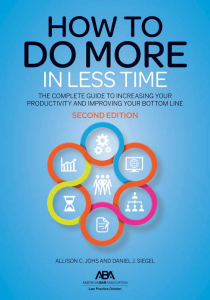 We have been saying it for years, in our books, in our courses, and to anyone else who will listen: Multitasking doesn’t work. People think they are multitasking, but they are really switch tasking. In other words, they are trying to do two or more things at once, and neither one gets their full attention.
We have been saying it for years, in our books, in our courses, and to anyone else who will listen: Multitasking doesn’t work. People think they are multitasking, but they are really switch tasking. In other words, they are trying to do two or more things at once, and neither one gets their full attention.
We said it in each edition of our book, How To Do More In Less Time, by Allison Johs and me (Daniel J. Siegel).
Here is some of what we say:
Give up multi-tasking
Our society has become one in which multi-tasking is seen as a good practice; people brag about being good multi-taskers and wear their attempts to accomplish many different things at once as a badge of honor. Many of those people think that they’re productive or getting a lot done because they’re multi-tasking. The truth is probably quite different.
In fact, studies have shown that (with few exceptions) the more you multitask, the less attention and focus you’re devoting to any of the tasks you’re trying to accomplish. In other words, when you multi-task, chances are that you’re not performing any of those tasks well.
Studies have also shown that multi-tasking wastes time, rather than saves it.
Considered from a different perspective, based on this study, for over 97% of the population, there’s no such thing as multi-tasking.[
The truth is that you can’t accomplish two things that require you to expend mental energy at once. You can only do one at a time. It’s how our brains are wired. When you “multi-task,” what you’re really doing is constantly switching back and forth between two or more tasks. In his book The Myth of Multi-tasking, Dave Crenshaw calls this “switch-tasking.” Switch-tasking actually costs time.[5]
The cost of switch-tasking
If you’ve ever had the experience of not remembering what you were doing after you’ve been interrupted, you know that it actually takes more time to get things done when you try to multitask. In his book, Brain Rules, John Medina contends that people who are interrupted – and therefore have to switch their attention back and forth – take 50% longer to accomplish a task. According to Medina, multi-tasking is nothing more than constantly interrupting the flow of work on one task to replace it with another, supporting the theory that what most people call multi-tasking is really switch-tasking.
Switch-tasking also costs time because it results in more errors. In Brain Rules, Medina confirms that those who attempt to multitask make up to 50% more errors. That means those tasks will need to be revisited or repeated. Simply put, fixing mistakes takes time.
Did you get that? What most people call multi-tasking actually results in the task taking 50% longer to complete, and multi-taskers make 50% more errors.
So the next time you brag about multitasking, think again.
